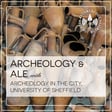
The Importance and Future of Archaeology: a personal view with John Barrett - Ep 40
Archaeology & Ale is a monthly series of talks presented by Archaeology in the City, part of the University of Sheffield Archaeology Department’s outreach programme. It's our honour to welcome Professor John Barrett speaking on the 'The Importance and Future of Archaeology: a personal view.' This talk took place on June 16th in-person and online via Google Meets.
John is an accomplished archaeologist with many decades of experience. He graduated from the University of Wales (University College Cardiff) and taught at the Universities of Leeds and Glasgow before joining the University of Sheffield in 1995.
John was appointed to a Chair in Archaeology in 2001, was Head of Archaeology 2002-2006, Dean of Arts 2007-2008, and Acting Head of Department of Biblical Studies 2009-2011. In 2005, he was invited as a Visiting Professor to the University of Heidelberg and has served on the various UK and overseas advisory boards in connection with commercial, museum and university-based archaeology. He is currently an Emeritus Professor at Sheffield's Department of Archaeology. John is currently involved in several research projects and writing programmes.
John continues to be interested in designing new archaeological methodologies that are theoretically sound and capable of empowering field archaeologists. He hopes that this will engage the wider community to participate in the archaeological investigation of historical processes.
In this talk, John will speak on his views about the future of commercial, academic, and community archaeology. In addition, he discusses the study's history and the contribution that archaeology can make to the ongoing climate crisis.
John Barrett, the Uni of Sheffield
https://www.sheffield.ac.uk/archaeology/our-people/academic-staff/john-c-barrett
Save Sheffield Archaeology
https://sites.google.com/view/save-sheffield-archaeology/home
Please sign our Petition!
https://www.change.org/p/university-of-sheffield-save-sheffield-s-archaeology-department
For more information about Archaeology in the City’s events and opportunities to get involved, please email archaeologyinthecity@sheffield.ac.uk or visit our website at archinthecity.wordpress.com. You can also find us on Twitter (@archinthecity), Instagram (@archaeointhecity), or Facebook (@archinthecity)
ArchPodNet
- APN Website: https://www.archpodnet.com
- APN on Facebook: https://www.facebook.com/archpodnet
- APN on Twitter: https://www.twitter.com/archpodnet
- APN on Instagram: https://www.instagram.com/archpodnet
- Tee Public Store
Affiliates
